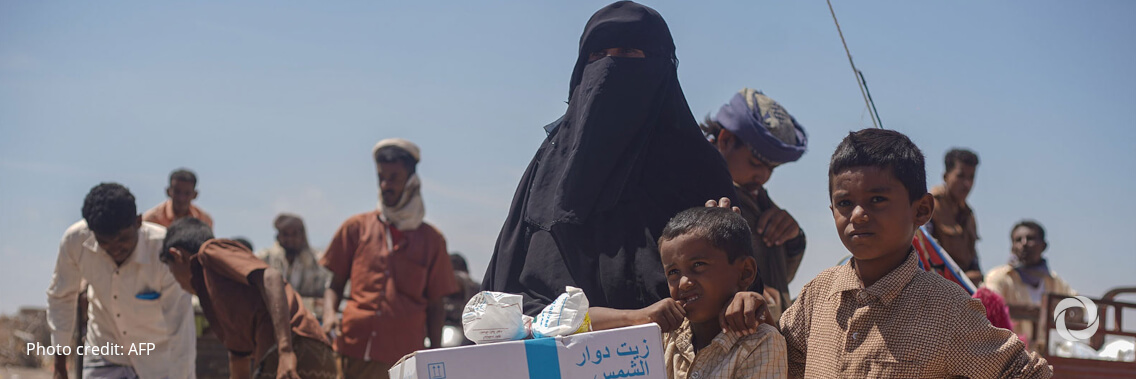As Islamic Relief welcomes a £2 million United Nations funding boost to expand the food aid program in Yemen, IR warns that peace is needed as desperately as humanitarian aid.
Over 2 million people rely on food aid by Islamic Relief, the main implementing partner for the UN World Food Programme in Yemen. The organization distributes regular food parcels that are a lifeline for families such as Feteeni’s.
“We were living on the frontlines between the two warring parties,” says the father-of-9. “Our lives flashed before our eyes as the airstrikes hit many neighboring houses. We had to flee to Sana’a.”
Although they escaped the frontlines of the war, the family could not escape hunger.
“Soaring prices made our lives go from bad to worse. Our only meal for the entire day is rice”, explains Feteeni, 62, who now receives food supplies through Islamic Relief.
“Every 2 months the organization provides us with a food basket including 70kg of flour, 10 liters of cooking oil, 5kg of beans, 5kg of sugar, 5kg of rice, and a sack of salt. The food basket alleviates our suffering, so we really appreciate all the support.”
Beyond food parcels
Other interventions we’ve been able to make with World Food Programme funding include enabling local people to improve their communities while earning an income.
“I do any job that I can find to provide for my family, says father-of-5 Ameen, a daily laborer who travels from village to village looking for work. “Before the conflict, we found work easily but now we barely find jobs.”
The badly damaged main road in Ameen’s village, Aljashari, made his daily quest to find work even tougher.
“Every day we walk for an hour, barefoot, to reach the main street. Vehicles can’t use the road because it is filled with debris, and we had so many accidents where the cars fell down the cliff.”
Ameen became one of 60 local people engaged in an Islamic Relief project to pave the road in his village.
“As well as the daily income that the organization provided for the work we did, we also benefit because the road can be used easily now. It only takes 15-30 minutes to reach the main road now.”
Ameen’s earnings from working to improve a road in his village helped him feed his family.
With the latest funding injection, IR will feed an extra 30,000 people, and the World Food Programme has pledged a further £10 million to support the vital work.
But much more is needed to halt Yemen’s slide toward catastrophe.
Yemen faces the world’s worst humanitarian crisis
“After more than 6 years of conflict, an economic downturn worsened by Covid-19 and a critical drop in humanitarian funding, the crisis in Yemen has never been graver,” says Aiman Alshahari, who works for Islamic Relief in Yemen.
Tens of thousands of people have been killed or injured and over 4 million people forced from their homes. Critical infrastructure lies in ruins.
A staggering 20.7 million people need humanitarian aid – that’s most of the population of the country, which is teetering on the brink of famine.
Yemen needs peace and humanitarian aid more desperately than ever
Islamic Relief first began working in poverty-stricken Yemen over 20 years ago. As the humanitarian crisis deteriorated over the years, IR remained on the side of vulnerable people in the country.
Working in often difficult and dangerous circumstances, the organization provides a lifeline across most of Yemen, including in hard-to-reach areas. Last year alone, it reached 3.7 million people with food aid, water, sanitation and hygiene, nutrition and healthcare, orphan and child welfare, survival items, and livelihoods.
The people of Yemen need aid more than ever, and Islamic Relief will continue to do all they can.
However, IR knows first-hand that humanitarian aid alone cannot end their suffering. Peace is needed now, more desperately than ever, and the organization urges the international community to redouble efforts to secure peace in Yemen, for good.

